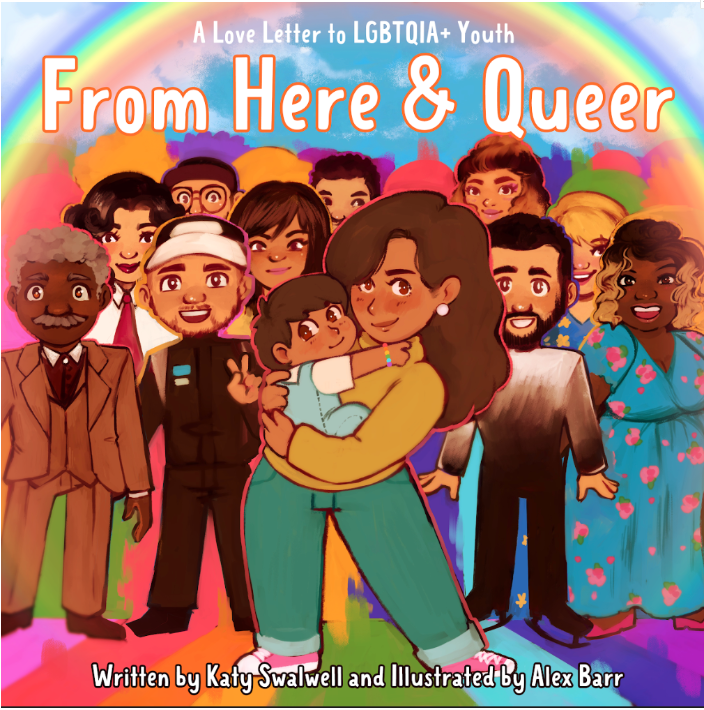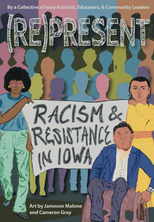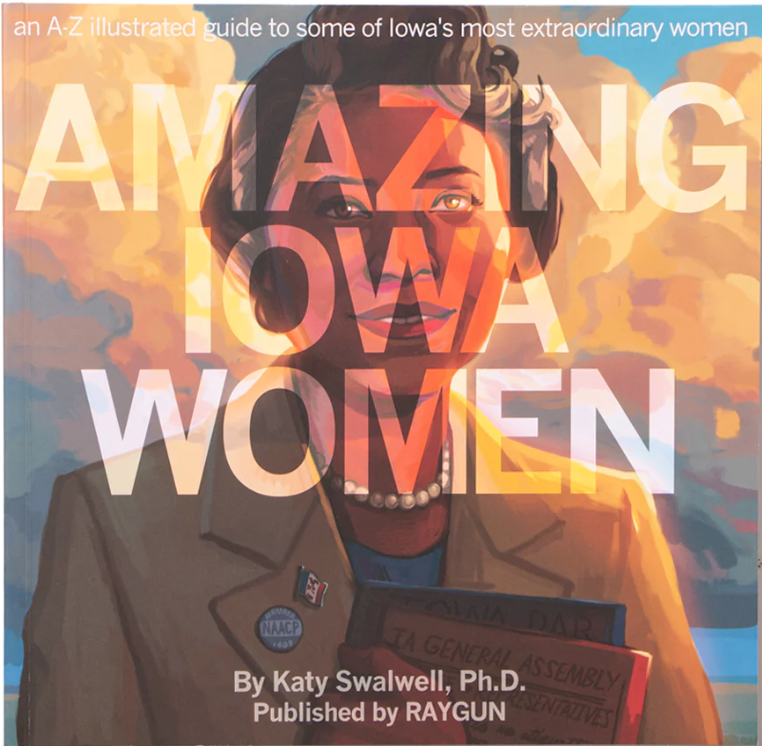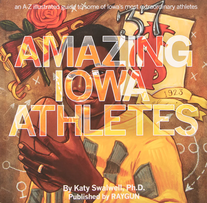FIX INJUSTICE, NOT KIDS
AND OTHER PRINCIPLES FOR TRANSFORMATIVE EQUITY LEADERSHIP
By Paul Gorski & Katy Swalwell
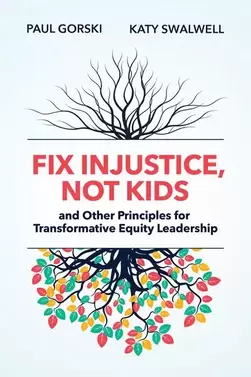
WINNER of the 2023 Philip C. Chinn Award from the National Association of Multicultural Education (NAME) and the American Consortium for Equity in Education (ACE-ED) annual Excellence in Equity Best Book for Educators Award!
Six principles for leading unequivocally in ways that disrupt inequity at its roots.
Fix Injustice, Not Kids and Other Principles for Transformative Equity Leadership offers a deep dive into the leadership values, commitments, and practices that help educational leaders create and sustain equitable schools and districts. Powerful stories from students and staff members reveal the troubling gaps between their everyday school experiences and the often high-optics, low-impact equity and diversity programs, events, and strategies embraced by school leaders. They also reveal key moments of growth as leaders learned how to deepen their equity understandings and enact more meaningful equity approaches. This thought-provoking book offers guidance to those who want to do better and are on the path to achieving some of today's most crucial goals: disrupting inequity and becoming transformative equity leaders.
Drawing from their extensive equity and inclusion work with schools, Paul Gorski and Katy Swalwell introduce key components of the equity literacy framework. They then challenge principals, equity professionals, and other K–12 leaders to embrace six guiding principles for meaningful equity leadership:
"So what can I do?" is a question that so many people ask when it comes to engaging in equity work at school. This is not the inquiry that will lead us to liberation. This book asks and answers a more powerful question: "If I care about children, their communities, and their futures, who do I need to become?"
--Cornelius Minor, author of We Got This: Equity, Access, and the Quest to Be Who Our Students Need Us to Be
Fix Injustice, Not Kids and Other Principles for Transformative Equity Leadership is exactly the book we need today when conversations about equity, diversity, and justice often are hijacked and distorted. This is a must-read for education leaders and professionals everywhere.
--Gloria Ladson-Billings, professor emerita, University of Wisconsin–Madison
Drawing on their extensive experience and research confronting injustice in education, Gorski and Swalwell's Fix Injustice, Not Kids and Other Principles for Transformative Equity Leadership is a gift to all who are committed to moving schools and school leaders from good intentions to powerful practices. Rooted by a most radical sense of equity, and grounded in real-life, supremely applicable approaches to making school structures more just and equitable, Fix Injustice, Not Kids needs to be read by current and future education leaders everywhere.
--Wayne Au, professor, University of Washington Bothell and editor, Rethinking Schools
Paul Gorski and Katy Swalwell offer fresh insights on the cumulative and multifaceted dimensions of inequity through their prescient and timely "equity literacy framework" that is chock-full of conceptual tools and strategies for the outright transformation of institutional cultures that reach beyond diversity and inclusion to foster genuine equity.
--Angela Valenzuela, PhD, author of Subtractive Schooling and Growing Critically Conscious Teachers: A Social Justice Curriculum for Educators of Latino/a Youth
Gorski and Swalwell have crafted for educational leaders a clear and courageous pathway beyond easy assumptions and good intentions—and toward decisive equity-literate skills and actions. Guided by scholarship, grown from their many years of practical experience in schools, and grounded in the reality of structural inequities—this is a foundational and transformational resource for achieving equitable and just schooling.
--Gary Howard, author of We Can't Lead Where We Won't Go: An Educator's Guide to Equity
As leaders, we should all strive to disrupt inequity. But just how do we do that? Look no further than Gorski and Swalwell's Fix Injustice, Not Kids and Other Principles for Transformative Equity Leadership. They provide a framework for moving beyond high-optics equity initiatives that only yield low-impact institutional results. Instead, they help leaders recognize inequity with a sharper lens and know how to disrupt it at its core.
--Zaretta Hammond, author of Culturally Responsive Teaching and the Brain: Promoting Authentic Engagement and Rigor Among Culturally and Linguistically Diverse Students
This insightful book asks us to look beyond the current zeitgeist of antiracist work and helps us develop principles about the work we're seeking to do. As a justice-oriented educator, I appreciate how Gorski and Swalwell delineate how to do this work with integrity, curiosity, and willingness to push boundaries on the status quo.
--José Luis Vilson, veteran educator, executive director of EduColor, and author of This Is Not a Test: A New Narrative on Race, Class, and Education
With their basic principles of equity literacy, Gorski and Swalwell share a vision for the transformative power of collective action toward living and breathing equity not only at work but also in our personal lives, so that we become threats to inequity everywhere we go.
--Dena Simmons, founder of LiberatED
Fix Injustice, Not Kids and Other Principles for Transformative Equity Leadership is a compelling and sometimes uncomfortable book for educators who are willing to confront the conditions that perpetuate inequity and who have the courage to take actions that actually cultivate equity. It sheds a bright light on how the difference between doing "something" in the name of equity and taking meaningful action can change the educational trajectory for young people who are marginalized by much of what we continue to do in schools and classrooms.
--Carol Ann Tomlinson, author of How to Differentiate Instruction in Academically Diverse Classrooms, 3rd Edition
I appreciated the authors' emphasis on transformative over mitigative equity and the rich principles and examples to illuminate the difference. This will help educators consider the impact of their efforts. Equity-focused educators serious about deepening their practice will benefit immensely from the explanation of action steps through the compelling equity literacy approach, powerful narratives, and relevant exercises. Get this book.
--Mark Anthony Gooden, author of Five Practices for Equity-Focused School Leadership
Transformational change through the lens of antiracism is a monumental undertaking—one that Paul Gorski and Katy Swalwell do not shy away from. Rather, in Fix Injustice, Not Kids and Other Principles for Transformative Equity Leadership, Gorski and Swalwell help educators and school communities confront that lift directly, moving past surface-level good intentions and toward changed, antiracist outcomes—long overdue for Black and Brown youth.
--Kass Minor, author of Teaching Fiercely: Spreading Joy and Justice in Our Schools and cofounder, The Minor Collective
Six principles for leading unequivocally in ways that disrupt inequity at its roots.
Fix Injustice, Not Kids and Other Principles for Transformative Equity Leadership offers a deep dive into the leadership values, commitments, and practices that help educational leaders create and sustain equitable schools and districts. Powerful stories from students and staff members reveal the troubling gaps between their everyday school experiences and the often high-optics, low-impact equity and diversity programs, events, and strategies embraced by school leaders. They also reveal key moments of growth as leaders learned how to deepen their equity understandings and enact more meaningful equity approaches. This thought-provoking book offers guidance to those who want to do better and are on the path to achieving some of today's most crucial goals: disrupting inequity and becoming transformative equity leaders.
Drawing from their extensive equity and inclusion work with schools, Paul Gorski and Katy Swalwell introduce key components of the equity literacy framework. They then challenge principals, equity professionals, and other K–12 leaders to embrace six guiding principles for meaningful equity leadership:
- Direct confrontation: Honestly naming and directly addressing the conditions that perpetuate inequity.
- Fix injustice, not kids: Avoiding deficit views, focused on “fixing” people who are marginalized, and embracing structural views, focused on eliminating inequitable conditions.
- Prioritization: Reimagining policies and practices and rebuilding institutional cultures in ways that account for historical and present inequities and their ramifications.
- Just access: Reconsidering what we provide equitable access to and whether it is itself equitable.
- Evidence-based equity: Applying an equity lens to the ways we collect and interpret data and exercising caution about popular data collection tools and methods.
- Care, joy, and sustainability: Withstanding inevitable resistance while embracing visions for love, joy, and community that cultivate and sustain transformative equity.
"So what can I do?" is a question that so many people ask when it comes to engaging in equity work at school. This is not the inquiry that will lead us to liberation. This book asks and answers a more powerful question: "If I care about children, their communities, and their futures, who do I need to become?"
--Cornelius Minor, author of We Got This: Equity, Access, and the Quest to Be Who Our Students Need Us to Be
Fix Injustice, Not Kids and Other Principles for Transformative Equity Leadership is exactly the book we need today when conversations about equity, diversity, and justice often are hijacked and distorted. This is a must-read for education leaders and professionals everywhere.
--Gloria Ladson-Billings, professor emerita, University of Wisconsin–Madison
Drawing on their extensive experience and research confronting injustice in education, Gorski and Swalwell's Fix Injustice, Not Kids and Other Principles for Transformative Equity Leadership is a gift to all who are committed to moving schools and school leaders from good intentions to powerful practices. Rooted by a most radical sense of equity, and grounded in real-life, supremely applicable approaches to making school structures more just and equitable, Fix Injustice, Not Kids needs to be read by current and future education leaders everywhere.
--Wayne Au, professor, University of Washington Bothell and editor, Rethinking Schools
Paul Gorski and Katy Swalwell offer fresh insights on the cumulative and multifaceted dimensions of inequity through their prescient and timely "equity literacy framework" that is chock-full of conceptual tools and strategies for the outright transformation of institutional cultures that reach beyond diversity and inclusion to foster genuine equity.
--Angela Valenzuela, PhD, author of Subtractive Schooling and Growing Critically Conscious Teachers: A Social Justice Curriculum for Educators of Latino/a Youth
Gorski and Swalwell have crafted for educational leaders a clear and courageous pathway beyond easy assumptions and good intentions—and toward decisive equity-literate skills and actions. Guided by scholarship, grown from their many years of practical experience in schools, and grounded in the reality of structural inequities—this is a foundational and transformational resource for achieving equitable and just schooling.
--Gary Howard, author of We Can't Lead Where We Won't Go: An Educator's Guide to Equity
As leaders, we should all strive to disrupt inequity. But just how do we do that? Look no further than Gorski and Swalwell's Fix Injustice, Not Kids and Other Principles for Transformative Equity Leadership. They provide a framework for moving beyond high-optics equity initiatives that only yield low-impact institutional results. Instead, they help leaders recognize inequity with a sharper lens and know how to disrupt it at its core.
--Zaretta Hammond, author of Culturally Responsive Teaching and the Brain: Promoting Authentic Engagement and Rigor Among Culturally and Linguistically Diverse Students
This insightful book asks us to look beyond the current zeitgeist of antiracist work and helps us develop principles about the work we're seeking to do. As a justice-oriented educator, I appreciate how Gorski and Swalwell delineate how to do this work with integrity, curiosity, and willingness to push boundaries on the status quo.
--José Luis Vilson, veteran educator, executive director of EduColor, and author of This Is Not a Test: A New Narrative on Race, Class, and Education
With their basic principles of equity literacy, Gorski and Swalwell share a vision for the transformative power of collective action toward living and breathing equity not only at work but also in our personal lives, so that we become threats to inequity everywhere we go.
--Dena Simmons, founder of LiberatED
Fix Injustice, Not Kids and Other Principles for Transformative Equity Leadership is a compelling and sometimes uncomfortable book for educators who are willing to confront the conditions that perpetuate inequity and who have the courage to take actions that actually cultivate equity. It sheds a bright light on how the difference between doing "something" in the name of equity and taking meaningful action can change the educational trajectory for young people who are marginalized by much of what we continue to do in schools and classrooms.
--Carol Ann Tomlinson, author of How to Differentiate Instruction in Academically Diverse Classrooms, 3rd Edition
I appreciated the authors' emphasis on transformative over mitigative equity and the rich principles and examples to illuminate the difference. This will help educators consider the impact of their efforts. Equity-focused educators serious about deepening their practice will benefit immensely from the explanation of action steps through the compelling equity literacy approach, powerful narratives, and relevant exercises. Get this book.
--Mark Anthony Gooden, author of Five Practices for Equity-Focused School Leadership
Transformational change through the lens of antiracism is a monumental undertaking—one that Paul Gorski and Katy Swalwell do not shy away from. Rather, in Fix Injustice, Not Kids and Other Principles for Transformative Equity Leadership, Gorski and Swalwell help educators and school communities confront that lift directly, moving past surface-level good intentions and toward changed, antiracist outcomes—long overdue for Black and Brown youth.
--Kass Minor, author of Teaching Fiercely: Spreading Joy and Justice in Our Schools and cofounder, The Minor Collective
SOCIAL STUDIES FOR A BETTER WORLD:
AN ANTI-OPPRESSIVE GUIDE FOR ELEMENTARY EDUCATORS
By Noreen Naseem Rodríguez & Katy Swalwell
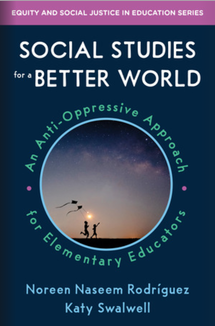
Plan and deliver a curriculum to help students connect with the humanity of others!
In the wake of 2020, we need today’s young learners to be prepared to develop solutions to a host of entrenched and complex issues, including systemic racism, massive environmental problems, deep political divisions, and future pandemics that will severely test the effectiveness and equity of our health policies. What better place to start that preparation than with a social studies curriculum that enables elementary students to envision and build a better world? In this engaging guide two experienced social studies educators unpack the oppressions that so often characterize the elementary curriculum—normalization, idealization, heroification, and dramatization—and show how common pitfalls can be replaced with creative solutions. Whether you’re a classroom teacher, methods student, or curriculum coordinator, this is a book that can transform your understanding of the social studies disciplines and their power to disrupt the narratives that maintain current inequities.
Order here and visit www.ssfabw.com for additional resources and information.
COMING SOON... Social Studies For A Better World: An Anti-Oppressive Guide for Secondary Educators with Delandrea Hall AND a second edition of SSFABW Elementary.
In the wake of 2020, we need today’s young learners to be prepared to develop solutions to a host of entrenched and complex issues, including systemic racism, massive environmental problems, deep political divisions, and future pandemics that will severely test the effectiveness and equity of our health policies. What better place to start that preparation than with a social studies curriculum that enables elementary students to envision and build a better world? In this engaging guide two experienced social studies educators unpack the oppressions that so often characterize the elementary curriculum—normalization, idealization, heroification, and dramatization—and show how common pitfalls can be replaced with creative solutions. Whether you’re a classroom teacher, methods student, or curriculum coordinator, this is a book that can transform your understanding of the social studies disciplines and their power to disrupt the narratives that maintain current inequities.
Order here and visit www.ssfabw.com for additional resources and information.
COMING SOON... Social Studies For A Better World: An Anti-Oppressive Guide for Secondary Educators with Delandrea Hall AND a second edition of SSFABW Elementary.
Praise for Social Studies for A Better World
"Brilliantly conceptualized, Social Studies for a Better World offers essential insights for understanding the ability of social studies to help students decipher the past and make sense of the present. Equally important, it provides an easy-to-follow blueprint for classroom implementation. This is essential reading for anyone who believes in the power of social studies to transform society."
—Hasan Kwame Jeffries, Associate Professor of History, The Ohio State University
“Speaking as scholars, educators, mothers, and human beings, Noreen Naseem Rodríguez and Katy Swalwell offer the support and inspiration educators need to skillfully practice anti-oppression in our classrooms and to prepare children to carry that practice into their lives outside of school.”
—Carla Shalaby, author of Troublemakers: Lessons in Freedom from Young Children at School
"No one should step into an elementary classroom without first reading Social Studies for a Better World. The book sings with possibility about creating classrooms of justice and kindness. It is utopian in the absolute best sense of the term. So many teaching books are dry as dust, and pedagogically unhelpful. But Noreen Naseem Rodríguez and Katy Swalwell know what they are talking about. Inviting, warm, and deeply humane, Social Studies for a Better World is the book that all elementary teachers need in these hard times."
—Bill Bigelow, Curriculum Editor, Rethinking Schools
"Brilliantly conceptualized, Social Studies for a Better World offers essential insights for understanding the ability of social studies to help students decipher the past and make sense of the present. Equally important, it provides an easy-to-follow blueprint for classroom implementation. This is essential reading for anyone who believes in the power of social studies to transform society."
—Hasan Kwame Jeffries, Associate Professor of History, The Ohio State University
“Speaking as scholars, educators, mothers, and human beings, Noreen Naseem Rodríguez and Katy Swalwell offer the support and inspiration educators need to skillfully practice anti-oppression in our classrooms and to prepare children to carry that practice into their lives outside of school.”
—Carla Shalaby, author of Troublemakers: Lessons in Freedom from Young Children at School
"No one should step into an elementary classroom without first reading Social Studies for a Better World. The book sings with possibility about creating classrooms of justice and kindness. It is utopian in the absolute best sense of the term. So many teaching books are dry as dust, and pedagogically unhelpful. But Noreen Naseem Rodríguez and Katy Swalwell know what they are talking about. Inviting, warm, and deeply humane, Social Studies for a Better World is the book that all elementary teachers need in these hard times."
—Bill Bigelow, Curriculum Editor, Rethinking Schools
ANTI-OPPRESSIVE EDUCATION IN 'ELITE' SCHOOLS: PROMISING PRACTICES & CAUTIONARY TALES FROM THE FIELD
Edited by Katy Swalwell & Daniel Spikes, afterword by Paul Gorski
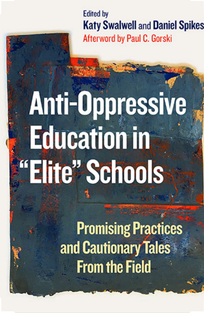
This collection of groundbreaking essays brings together a diverse group of experts who are researching, theorizing, and enacting anti-oppressive education in “elite” schooling environments—that is, schools imbued with wealth and whiteness. This volume explores how those who are in a position of power can be educated to take active steps that reduce and disrupt oppression. From unique points of view as educators, students, or researchers, the contributors address why this work matters, what is needed to sustain it, what are common pitfalls and how can they be avoided? Readers are encouraged to mull over various perspectives and experiences to find answers that fit their own contexts.
- -- Identifies ethical and effective pedagogical and curricular approaches to use with students in “elite” school settings.
- -- Examines what it means to work or learn in “elite” educational spaces for those who hold non-dominant identities.
- -- Explores the special obligations and responsibilities these schools require furthering justice.
- -- Looks at how teachers can navigate the unique challenges that arise, the conditions needed to support them, and what counts as success for anti-oppressive education in “elite” schools.
EDUCATING ACTIVIST ALLIES
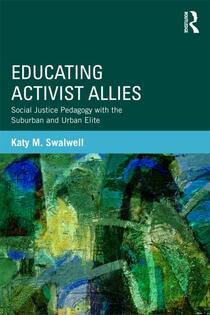
One of CHOICE Magazine’s 2013 Outstanding Academic Titles and an Honorable Mention for the 2014 AERA Division B-Curriculum Studies Outstanding Book Award
Praise for Educating Activist Allies (Routledge, 2013):
"In this accessible, story-rich volume, Swalwell offers example after example of how educators in different elite contexts attempt to teach for social justice—described in many instances through her own careful observations of their teaching. Interviews with students offer a window into how this teaching was received. This is a valuable book for any educator trying to clarify what it means to teach for social justice, but especially for those who find themselves teaching the children of the wealthy." —Rethinking Schools Editorial Board
"In this book, Katy Swalwell reminds us that critical consciousness is not just the purview of the marginalized, and that lasting social change based on equity and justice requires a transformation in consciousness of all people, including elites. Filled with eloquently written prose, sharp political analysis, and powerful story, Educating Activist Allies grounds us in the challenges of teaching for social justice while providing concrete hopeful models of practice."
—Wayne Au, Author of Unequal By Design
Praise for Educating Activist Allies (Routledge, 2013):
"In this accessible, story-rich volume, Swalwell offers example after example of how educators in different elite contexts attempt to teach for social justice—described in many instances through her own careful observations of their teaching. Interviews with students offer a window into how this teaching was received. This is a valuable book for any educator trying to clarify what it means to teach for social justice, but especially for those who find themselves teaching the children of the wealthy." —Rethinking Schools Editorial Board
"In this book, Katy Swalwell reminds us that critical consciousness is not just the purview of the marginalized, and that lasting social change based on equity and justice requires a transformation in consciousness of all people, including elites. Filled with eloquently written prose, sharp political analysis, and powerful story, Educating Activist Allies grounds us in the challenges of teaching for social justice while providing concrete hopeful models of practice."
—Wayne Au, Author of Unequal By Design
CHILDREN'S BOOKS
Amazing Iowa Women Named to the Library of Congress Great Places, Great Reads Special Collection
Amazing Iowa Women and Amazing Iowa Athletes, Winner of the 2021 Loren Horton Community History Award Certificate of Recognition for Outstanding Research or Publication from the Iowa State Historical Society
Click here to access information about the books, traveling exhibits, and supplemental curriculum for the Amazing Iowa series launched in 2018. Illustrated by Iowa artists, the books include kid-friendly biographies of incredible Iowans from diverse backgrounds. For purchasing the books, check out RAYGUN.
Click here for books published by Past Present Future Publishing, including (Re)Present: Racism & Resistance in Iowa and From Here & Queer.
Amazing Iowa Women and Amazing Iowa Athletes, Winner of the 2021 Loren Horton Community History Award Certificate of Recognition for Outstanding Research or Publication from the Iowa State Historical Society
Click here to access information about the books, traveling exhibits, and supplemental curriculum for the Amazing Iowa series launched in 2018. Illustrated by Iowa artists, the books include kid-friendly biographies of incredible Iowans from diverse backgrounds. For purchasing the books, check out RAYGUN.
Click here for books published by Past Present Future Publishing, including (Re)Present: Racism & Resistance in Iowa and From Here & Queer.
THE CRITICAL SOCIAL EDUCATOR
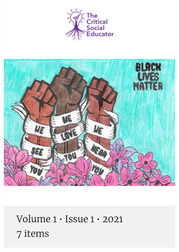
Co-founded with Sarah Pamperin, Katie Payne, Carla Shalaby, Noreen Naseem Rodríguez, and Sarah Shear, Katy serves as one of the members of the Editorial Collective for The Critical Social Educator.
The Critical Social Educator is an open access, peer-reviewed, multidisciplinary journal designed to connect practitioners and researchers interested in documenting the challenges and possibilities of critical social education at the elementary level. By critical, we mean an examination of power relations with a focus on injustice and oppression in terms of how these operate within sites of learning as well as efforts to disrupt them. By social education, we mean all experiences through which children learn about the social world and their participation in it. By elementary, we mean educational experiences that include children ages 5-12 and/or prepare adults teaching and learning with this age group. The journal aims to provide a space for researchers and practitioners to be in dialogue about the possibilities and challenges of critical social education at the elementary level.
The Critical Social Educator is an open access, peer-reviewed, multidisciplinary journal designed to connect practitioners and researchers interested in documenting the challenges and possibilities of critical social education at the elementary level. By critical, we mean an examination of power relations with a focus on injustice and oppression in terms of how these operate within sites of learning as well as efforts to disrupt them. By social education, we mean all experiences through which children learn about the social world and their participation in it. By elementary, we mean educational experiences that include children ages 5-12 and/or prepare adults teaching and learning with this age group. The journal aims to provide a space for researchers and practitioners to be in dialogue about the possibilities and challenges of critical social education at the elementary level.
SELECTED PEER REVIEWED PUBLICATIONS
Swalwell, K., Rodríguez, N.N., Updegraff, A., & Winters, L. (2023). Distracting, erasing, and othering: A critical analysis of the Teachers Pay Teachers' Teach for Justice Collection. Harvard Educational Review, 93(1), 104-130.
Dodman, S. L., Swalwell, K., DeMulder, E. K., & Stribling, S. M. (2021). Critical data-driven decision making: A conceptual model of data use for equity. Teaching and Teacher Education, 99, 103272.
Swalwell, K. & Sinclair, K. (2020). The appeal of a controversial text: Who uses A People’s History of the United States in the U.S. history classroom and why. Journal of Social Studies Research.
Gallagher, J., Swalwell, K., & Almond-Bellows, E. (2019). Pinning with pause: Supporting teachers’ critical consumption on sites of curriculum sharing. Social Education, 83(4), 217-224.
Howard, A. Swalwell, K., & Adler, K. (2018). Making class: Children’s perceptions of class through illustrations. Teachers College Record, 120(7).
Swalwell, K. & Schweber, S. (2016). Teaching through turmoil: Social studies teachers & local controversial events. Theory and Research in Social Education, 44(3), 283-315.
Swalwell, K., Pellegrino, A., & View, J. (2015). Teachers' curricular choices when teaching histories of oppressed people: Capturing the U.S. Civil Rights Movement. Journal of Social Studies Research, 39(1).
Swalwell, K. (2013). "With great power comes great responsibility": Privileged students' conceptions of justice-oriented citizenship. Democracy & Education, 21(1).
Dodman, S. L., Swalwell, K., DeMulder, E. K., & Stribling, S. M. (2021). Critical data-driven decision making: A conceptual model of data use for equity. Teaching and Teacher Education, 99, 103272.
Swalwell, K. & Sinclair, K. (2020). The appeal of a controversial text: Who uses A People’s History of the United States in the U.S. history classroom and why. Journal of Social Studies Research.
Gallagher, J., Swalwell, K., & Almond-Bellows, E. (2019). Pinning with pause: Supporting teachers’ critical consumption on sites of curriculum sharing. Social Education, 83(4), 217-224.
Howard, A. Swalwell, K., & Adler, K. (2018). Making class: Children’s perceptions of class through illustrations. Teachers College Record, 120(7).
Swalwell, K. & Schweber, S. (2016). Teaching through turmoil: Social studies teachers & local controversial events. Theory and Research in Social Education, 44(3), 283-315.
Swalwell, K., Pellegrino, A., & View, J. (2015). Teachers' curricular choices when teaching histories of oppressed people: Capturing the U.S. Civil Rights Movement. Journal of Social Studies Research, 39(1).
Swalwell, K. (2013). "With great power comes great responsibility": Privileged students' conceptions of justice-oriented citizenship. Democracy & Education, 21(1).
SELECTED PRACTITIONER PUBLICATIONS
Gorski, P. & Swalwell, K. (2023). Moving from Equity Awareness to Action. Educational Leadership.
Naseem Rodríguez, N. & Swalwell, K. (2023). How to Thwart an Anti-Equity Agenda: Advice for Teachers, Administrators, and Families. EdWeek.
Gorski, P., DuBose, M., & Swalwell, K. (2022). Trading Baby Steps for Big Equity Leaps. Educational Leadership.
Gorski, P. & Swalwell, K. (2015). Equity literacy for all. Educational Leadership.
Swalwell, K. (2011). Why our students need equity literacy. Teaching Tolerance.
Naseem Rodríguez, N. & Swalwell, K. (2023). How to Thwart an Anti-Equity Agenda: Advice for Teachers, Administrators, and Families. EdWeek.
Gorski, P., DuBose, M., & Swalwell, K. (2022). Trading Baby Steps for Big Equity Leaps. Educational Leadership.
Gorski, P. & Swalwell, K. (2015). Equity literacy for all. Educational Leadership.
Swalwell, K. (2011). Why our students need equity literacy. Teaching Tolerance.
SELECTED AWARDS & RECOGNITIONS
2023 National Association of Multicultural Educators Philip C. Chinn Award for Fix Injustice, Not Kids
American Consortium for Equity in Education Excellence in Equity Best Book Award for Fix Injustice, Not Kids
2021 Iowa State Historical Society Loren Horton Community History Award for Outstanding Research or Publication
Amazing Iowa Women and Amazing Iowa Athletes
2020 ISU College of Human Sciences, Faculty Award for Inclusive Achievement
State Library of Iowa selection of Amazing Iowa Women for the Library of Congress Great Reads Great Places list
2016 National Council of Social Studies, Research Into Practice Award, Honorable Mention for Swalwell, K. & Schweber, S. (2016)
2014 Outstanding Faculty Award, Iowa State University Greek Community
AERA Division B-Curriculum Studies, Outstanding Book Award, Honorable Mention for Educating Activist Allies
2013 Kipchoge Kirkland Social Justice Award, College & University Faculty Assembly - National Council of Social Studies
CHOICE Magazine Outstanding Academic Title for Educating Activist Allies
2012 Outstanding Dissertation Award, American Educational Research Association - Division B (Curriculum Studies)
American Consortium for Equity in Education Excellence in Equity Best Book Award for Fix Injustice, Not Kids
2021 Iowa State Historical Society Loren Horton Community History Award for Outstanding Research or Publication
Amazing Iowa Women and Amazing Iowa Athletes
2020 ISU College of Human Sciences, Faculty Award for Inclusive Achievement
State Library of Iowa selection of Amazing Iowa Women for the Library of Congress Great Reads Great Places list
2016 National Council of Social Studies, Research Into Practice Award, Honorable Mention for Swalwell, K. & Schweber, S. (2016)
2014 Outstanding Faculty Award, Iowa State University Greek Community
AERA Division B-Curriculum Studies, Outstanding Book Award, Honorable Mention for Educating Activist Allies
2013 Kipchoge Kirkland Social Justice Award, College & University Faculty Assembly - National Council of Social Studies
CHOICE Magazine Outstanding Academic Title for Educating Activist Allies
2012 Outstanding Dissertation Award, American Educational Research Association - Division B (Curriculum Studies)
